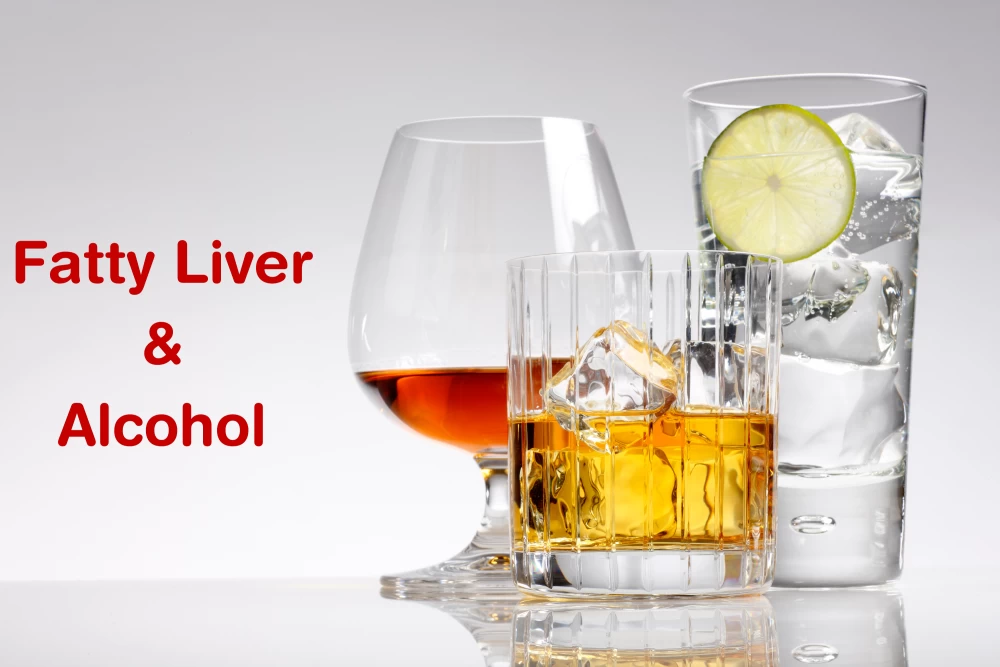
- 25th March 2023
What is Fatty Liver?
Fatty liver is a condition that occurs when there is an excessive buildup of fat in the liver cells. This accumulation can cause inflammation and damage to the liver, leading to complications such as cirrhosis and liver failure if left untreated. Non-alcoholic fatty liver disease (NAFLD) is the most common form of fatty liver, which usually affects people who are overweight or have high cholesterol levels. Alcohol consumption can also lead to fatty liver disease, which is known as alcoholic fatty liver disease (AFLD). It occurs when the liver cannot break down alcohol effectively, causing fat to accumulate in the organ. Chronic heavy drinking can cause severe damage to the liver and increase the risk of developing other forms of liver diseases such as cirrhosis. It's important to note that not all people who consume alcohol excessively will develop AFLD. However, individuals who are overweight or have diabetes are at higher risk for this type of fatty liver disease. Additionally, it's essential to limit alcohol intake or stop consuming it altogether if you already have AFLD or other forms of chronic illness that affect your body's ability to process fats properly.
Causes of Fatty Liver
One of the most common causes of fatty liver is excessive alcohol consumption. When someone drinks alcohol, their liver has to work overtime to process and eliminate it from the body. Consuming too much alcohol over an extended period of time can lead to a buildup of fat in the liver, which can cause inflammation and damage if left untreated. Another cause of fatty liver is excess weight or obesity. When someone carries too much weight, especially around their midsection, it can increase their risk for developing non-alcoholic fatty liver disease (NAFLD). This occurs when fat accumulates in the liver even without consuming excessive amounts of alcohol. Other less common causes of fatty liver include certain medications, viral hepatitis infections, and genetic disorders. It's important for individuals who are concerned about their risk for developing fatty liver disease to speak with their healthcare provider about any lifestyle factors or underlying health conditions that may be contributing to this condition.
Effects of Heavy Alcohol Consumption
Heavy alcohol consumption can have a significant impact on liver health. One of the most common conditions associated with excessive drinking is fatty liver disease. This condition occurs when fat accumulates in the liver, causing it to become enlarged and inflamed. Over time, this inflammation can lead to cirrhosis and other serious complications. Fatty liver disease is often asymptomatic in its early stages, but as it progresses, symptoms may include fatigue, abdominal pain, and jaundice. In addition to alcohol consumption, other risk factors for fatty liver disease include obesity and type 2 diabetes. If you're concerned about your liver health or have a history of heavy drinking, it's important to talk to your healthcare provider about screening for fatty liver disease. Making lifestyle changes such as reducing alcohol intake and maintaining a healthy weight can help prevent or manage fatty liver disease.
Link Between Alcohol and Fatty Liver Disease
Fatty liver disease is a health condition that occurs when there is an accumulation of fat in the liver. One of the leading causes of fatty liver disease is excessive alcohol consumption. Alcohol can damage the liver cells and cause inflammation, leading to a buildup of fat in the liver. Over time, this can progress to more severe forms of liver disease such as cirrhosis. The link between alcohol and fatty liver disease is well established, with studies showing that even moderate drinking can increase the risk for developing this condition. However, not everyone who drinks heavily will develop fatty liver disease, suggesting that other factors such as genetics may also play a role. If you have been diagnosed with fatty liver disease, it is important to reduce or eliminate your alcohol intake to prevent further damage to your liver. Making lifestyle changes such as eating a healthy diet and exercising regularly can also help improve your overall health and reduce your risk for complications related to fatty liver disease.
Treatments for Fatty Liver
One of the best treatments for fatty liver is lifestyle changes, which can help reduce inflammation and improve liver function. This includes following a healthy diet that is low in fat, sugar, and alcohol. Regular exercise can also help reduce fat buildup in the liver and promote weight loss. For those with alcoholic fatty liver disease, the most effective treatment is to stop drinking alcohol altogether. This can be difficult, but it is essential for preventing further damage to the liver. In severe cases, hospitalization may be necessary to manage withdrawal symptoms. In addition to lifestyle changes, there are medications available that can help treat non-alcoholic fatty liver disease (NAFLD). These include insulin-sensitizing drugs like pioglitazone and metformin, as well as lipid-lowering medications like statins. However, it's important to note that these medications are not a substitute for lifestyle changes and should only be used under a doctor's supervision.
Prevention Tips for Avoiding Alcohol Abuse

1. One of the most effective ways to prevent alcohol abuse and its harmful effects on the liver is by limiting alcohol intake. According to medical experts, men should consume no more than two drinks per day, while women should limit themselves to one drink per day. A standard drink equals 12 ounces of beer, 5 ounces of wine, or 1.5 ounces of distilled spirits.
2. Another way individuals can avoid alcohol abuse is by avoiding binge drinking episodes altogether. Binge drinking occurs when a man consumes five or more alcoholic beverages within two hours or when a woman has four or more drinks in the same timeframe. Engaging in binge drinking frequently can lead to severe liver damage and other health problems.
3. Additionally, seeking help from a professional counselor or therapist can also assist those struggling with alcohol addiction to overcome their dependency on the substance effectively. Support groups like Alcoholics Anonymous (AA) provide an excellent platform for those struggling with addiction to share their experiences and receive encouragement from others who have successfully recovered from addiction-related issues previously. In conclusion, it's crucial that individuals take proactive measures towards preventing alcohol abuse and creating healthier habits for themselves long-term- especially if they've been diagnosed with fatty liver disease caused by excessive consumption of alcoholic beverages over time!
Conclusion: Understanding the Risks
In conclusion, understanding the risks associated with fatty liver disease is crucial. While alcohol consumption can increase the likelihood of developing this disease, it's important to note that other factors such as obesity and diabetes can also contribute to its development. In addition, fatty liver disease is often asymptomatic, meaning that individuals may not even be aware they have it until it progresses into a more serious condition. Therefore, it's important for individuals who are at risk of developing fatty liver disease to get regular check-ups and screenings from their healthcare provider. This includes individuals who consume alcohol in excessive amounts or those who have other risk factors such as obesity or diabetes. By understanding the risks associated with fatty liver disease and taking proactive steps towards prevention, individuals can maintain optimal health and well-being.














